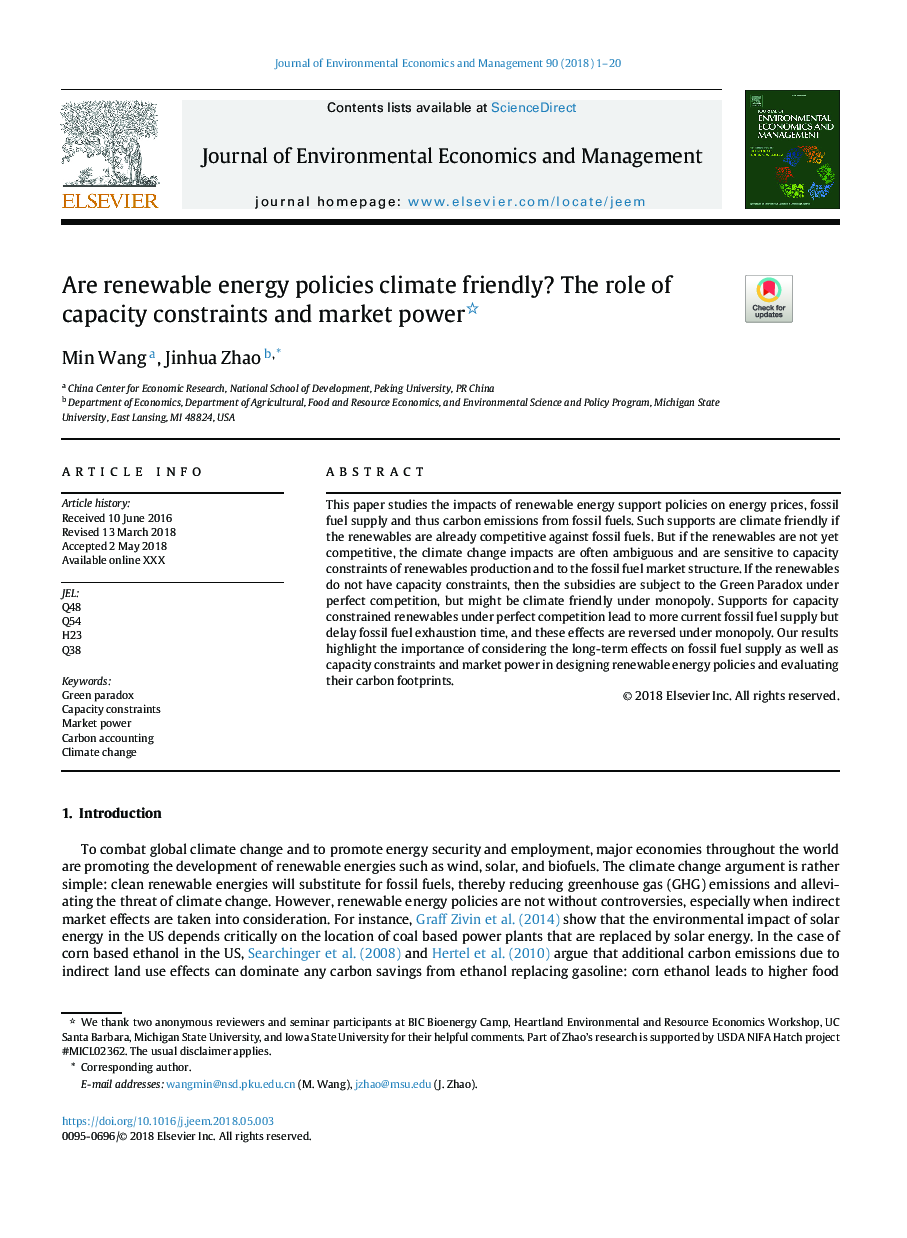| کد مقاله | کد نشریه | سال انتشار | مقاله انگلیسی | نسخه تمام متن |
|---|---|---|---|---|
| 7361201 | 1478856 | 2018 | 20 صفحه PDF | دانلود رایگان |
عنوان انگلیسی مقاله ISI
Are renewable energy policies climate friendly? The role of capacity constraints and market power
ترجمه فارسی عنوان
آیا سیاست های انرژی تجدید پذیر دوستانه است؟ نقش محدودیت های ظرفیت و قدرت بازار
دانلود مقاله + سفارش ترجمه
دانلود مقاله ISI انگلیسی
رایگان برای ایرانیان
کلمات کلیدی
ترجمه چکیده
در این مقاله تاثیرات سیاست های حمایت از انرژی تجدید پذیر در مورد قیمت های انرژی، تامین سوخت فسیلی و در نتیجه انتشار کربن از سوخت های فسیلی مورد بررسی قرار می گیرد. چنین پشتیبانی هایی در صورتی که انرژی های تجدید پذیر در برابر سوخت های فسیلی رقابت می کنند، مناسبات با محیط زیست است. اما اگر انرژیهای تجدید پذیر هنوز رقابتی نیستند، تاثیرات تغییرات آب و هوایی اغلب مبهم هستند و به محدودیت های ظرفیت تولید انرژی های تجدید پذیر و ساختار بازار سوخت فسیلی حساس هستند. اگر منابع تجدید پذیر محدودیت ظرفیتی نداشته باشند، پس یارانه ها به عنوان پارادوکس سبز تحت رقابت کامل قرار می گیرند، اما ممکن است تحت نظر انحصار محیط زیست باشند. پشتیبانی از ظرفیت های انرژی تجدیدپذیر تحت رقابت کامل منجر به جریان فعلی سوخت فسیلی می شود، اما تاخیر در تأمین سوخت فسیلی تاخیر می یابد و این اثرات تحت انحصار هستند. نتایج ما اهمیت توجه به اثرات دراز مدت بر عرضه سوخت فسیلی، محدودیت ظرفیت و قدرت بازار در طراحی سیاست های انرژی تجدید پذیر و ارزیابی اثرات کربن آنها را برجسته می کند.
موضوعات مرتبط
علوم انسانی و اجتماعی
اقتصاد، اقتصادسنجی و امور مالی
اقتصاد و اقتصادسنجی
چکیده انگلیسی
This paper studies the impacts of renewable energy support policies on energy prices, fossil fuel supply and thus carbon emissions from fossil fuels. Such supports are climate friendly if the renewables are already competitive against fossil fuels. But if the renewables are not yet competitive, the climate change impacts are often ambiguous and are sensitive to capacity constraints of renewables production and to the fossil fuel market structure. If the renewables do not have capacity constraints, then the subsidies are subject to the Green Paradox under perfect competition, but might be climate friendly under monopoly. Supports for capacity constrained renewables under perfect competition lead to more current fossil fuel supply but delay fossil fuel exhaustion time, and these effects are reversed under monopoly. Our results highlight the importance of considering the long-term effects on fossil fuel supply as well as capacity constraints and market power in designing renewable energy policies and evaluating their carbon footprints.
ناشر
Database: Elsevier - ScienceDirect (ساینس دایرکت)
Journal: Journal of Environmental Economics and Management - Volume 90, July 2018, Pages 41-60
Journal: Journal of Environmental Economics and Management - Volume 90, July 2018, Pages 41-60
نویسندگان
Min Wang, Jinhua Zhao,
